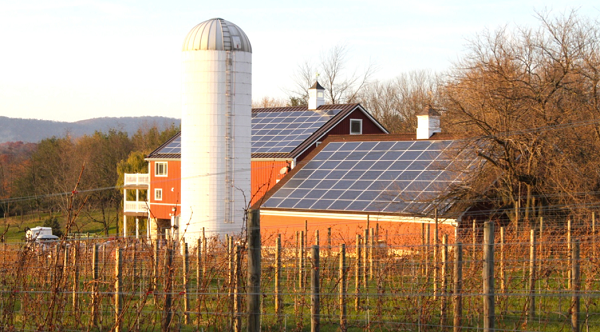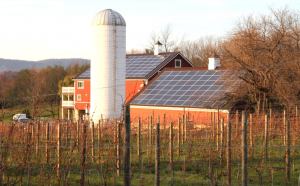Farm uses solar to off-set energy bills

 Richard and Tommye Lou Rafes are farmers and retired educators who live on a mountaintop in Greenbrier County. Their diversified farming operation supplies fresh, local produce year-round to area farmers’ markets, schools, restaurants, and CSA subscribers. Richard and Tommye cultivate three-dozen varieties of vegetables and a dozen types of fruits and berries in gardens, orchards, raised beds, and high tunnels. They also raise ducks and sell duck eggs.
Richard and Tommye Lou Rafes are farmers and retired educators who live on a mountaintop in Greenbrier County. Their diversified farming operation supplies fresh, local produce year-round to area farmers’ markets, schools, restaurants, and CSA subscribers. Richard and Tommye cultivate three-dozen varieties of vegetables and a dozen types of fruits and berries in gardens, orchards, raised beds, and high tunnels. They also raise ducks and sell duck eggs.
In May of this year, the Rafeses went solar through the Lewisburg Solar Co-op. Richard says he joined the co-op after attending a WV SUN solar info session. “The great thing about the co-op is that [WV SUN] handles all the details,” he says. “So we knew we were going to get a quality contractor that was going to be used by a number of people in the area.”
The Rafeses wanted enough solar panels to offset 100% of their farm’s annual electricity consumption. Solar Holler, the company selected to service the co-op, designed a 70-panel, 21-kilowatt (kW) solar array that completely covers one side of the Rafeses’ barn roof. The panels will produce around 24,000 kilowatt-hours (kWh) of electricity annually.
The Rafeses receive credit on their monthly electric bills for the energy their solar panels produce through net metering. “Last month we actually produced more kilowatts than we consumed, so we have a credit with FirstEnergy to offset our future [electric bills],” Richard said.
The Rafeses’ interest in solar stretches back decades, to their time living in Texas in the early 1980s. “We were one of the first families in Denton, Texas, to have solar panels on our roof,” Richard said. “But they only heated water. [Solar technology] has improved so much since then.”
One reason the Rafeses chose to go solar again today was to minimize their carbon footprint. “We have a clear commitment to renewable energy,” Richard said. “We want to actually produce the energy that we consume.”
The Rafeses also invested in solar in order to lower their farm’s operating costs. By producing their own electricity on site, they will benefit from drastically lowered electricity bills for decades into the future. And the cost of solar is more affordable than ever.
In addition to a 30% federal tax credit (in place in full through 2019), the Rafeses received a grant from the USDA Rural Energy for America Program (REAP) to help offset the cost of going solar on their farm. “It’s a real good investment to go solar,” Richard said. “There’s a really short-term payback [period].”
Solar Holler helped the Rafeses write and submit the grant application. Along with Mountain View Solar and DT Solar, Solar Holler is one of three local solar installers participating in a statewide WV SUN program to help more farmers in the Mountain State go solar.
Through our Ag Producers’ Solar Co-op, WV SUN helps West Virginia farmers access funding for solar such as USDA REAP. WV SUN also provides technical assistance and helps participants solicit and review solar proposals. We support, advise, and advocate for our members throughout the process of going solar.
The Ag Producers’ Solar Co-op is open to West Virginia farmers for whom at least 50% of gross income comes from on-site agricultural operations. For more information and to sign up for the program, visit our website or contact Autumn Long, WV SUN Solar Co-op Coordinator, at 304-608-3539 or autumn@solarunitedneighbors.org.
